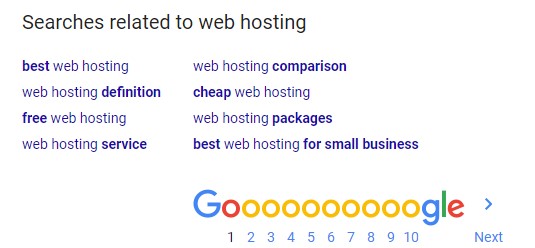Keyword research consisting of both head (one to two words) and long tail keywords (four or more words) along with medium tail keywords (three words maximum) is the process of finding the search terms that users are searching for, on Google and Bing and click on a website link that is listed at the top of the Search Engine Results Pages (SERPs).
The top 5 organic listings on the Google SERPs hog 65% of the user clicks. This explains the mad rush for the coveted top spots on the search results pages. It accounts not only for a deluge of traffic but also laser targeted top quality traffic.
What Is The Purpose Of Keyword Strategy?
When it comes to keyword strategy, it is important to rank for as many niche keywords as your site can. Many marketers are obsessed with ranking at the top for head keywords, say home builder. This is an extremely competitive keyword phrase showing 769 million results (note that one word is a keyword and more than one word keyword becomes a keyword phrase).
You have worked hard to rank at the top of Google for the keyword phrase home builder. Visitors who land on your site, a large proportion of them, would tend to bounce away from your site. This is because, the search term you have optimized your site for, is too generic.
Imagine your company is in South East Florida. A visitor from Lead, South Dakota would be least inclined to contact you unless you have home building operations running particularly in SD and possibly all over the US. Most would prefer to hire a local builder.
The example used here is to highlight the importance of user intent. If your site had been optimized for the keyword phrase florida home builder, you may not have visitors on the scale of those clicking on the generic home builder term but you will have far more laser targeted visitors for this term, mostly Floridians looking to build their homes.
The ideal keyword strategy is one that truly satisfies the user intent of looking for products and/or services that is of interest to your visitors. If your site offers something very relevant to what they are looking for, it is a win-win situation for both the buyer and seller. The word to keep in mind here is relevance.
How Do People Search on Google?
The answer to this question reveals your keyword strategy. If you have a site that is all about web hosting, users looking for web hosting can search for cpanel hosting, linux hosting, php mysql hosting, shared web hosting and tons of other ways, expressing the same intent. At the end of it all, they are just seeking web hosting.
Instead of trying to focus on the highly competitive web hosting keyword phrase, there are so many other less competitive yet decent search volume keyword terms that can be targeted instead.
Keyword research shows that short tail keywords (2 words maximum) make up for nearly 18.5% of all searches made. Medium tail keywords (3 words maximum) account for 11.5%. The long tail keywords (4 words and above), well you guessed it, make up for a whopping 70% of searches.
What Is Best Strategy For Top Ranking?
Let’s take the web hosting keyword phrase example. Consider keyword research to be a pyramid shaped structure. The short tail keyword, web hosting is the top of the pyramid. The long tail and medium tail keywords are the base of the pyramid.
Look For Keyword Themes In Your Niche
The medium and long tail keywords are normally derivatives/variants of a highly competitive short tail keyword phrase. If the short tail is web hosting, then there are so many variants of this term that can be grouped into themes like linux web hosting, windows web hosting, reseller web hosting etc.
For example, if linux web hosting has a search volume of 4000 searches per month, then linux web hosting could have 2000 searches per month. Linux cpanel web hosting can account for 1000 searches per month. You can see the pattern of descending search volume for very similar keywords that you can push into a tightly knit keyword group. A new page of content for Linux web hosting is born on your site.
Focus on writing content based on long tail and medium tail keyword phrases. There are numerous search terms you can cover by throwing a wider net in the lake. The competition is less for these keywords.
Examples in this case, in no particular order, is displayed below. The SEO search difficulty is low to moderate.

As you create more and more content, over time, the site will ultimately rank for short tail keywords (web hosting in this case). You have to maintain top quality content so as to get the articles indexed on Google. Ranking is something to think about once the content gets indexed by Google successfully.
Inviting The User Click On The SERPs
Another couple of important considerations for your articles that rank on Google search engine listings are as follows:
- Have an attractive title for your post. It is the title that draws the visitor’s eye. The title should be truly representative of the content you have created.
- Equally important is the meta description. This is the snippet that appears below the title. Google and Bing are smart enough to pull out this snippet from your content, based on the searcher’s query. There is no harm in having a good meta description.

Attractive yet meaningful title and description invites the user’s click as this is the initiator of the user experience on your site. The longer they spend reading your site’s content, and the more actions they take on your site, these are all positive signals for Google that satisfies their goal of providing best search experience to their users.
It is then a combination of time and hard work as you keep churning out superior content that answers your readers’ questions and provide great insights in your business domain that separates your site from the regurgitated sites of your competitors.
The Length Of The Search Term
Most medium and long tail keywords are three words and more, combined to form a single keyword phrase. The longer the search term, the more clearer the user intent. There is definitely a huge difference between the terms web hosting and cpanel linux web hosting. When the user intent is clear, Google displays the highest quality results.
Keyword Jargon
Like any other field, keyword research has its own specific lingo that you should be aware of. Let’s discuss a few below.
Keyword Stemming
Keyword stemming has been part of Google’s search algorithm for a long time. It uses the root or base word in the English language that gives rise to several other words.
For interest sake, lot of the English words are from Latin. If you take the root word “pugnare”, it means to fight. This translates into words like pugnacious, repugnant, pugilist, expugn etc, to name a few. All the words have something to do with pugnare and can be grouped.
Singular Vs Plural Form Of Search Term
Google’s algorithm treats the singular version of a search term differently from that of its plural version. To us humans, this seems strange as it is just a case of one vs many of the same object.
Search Engines Use Semantics
Semantics is branch of linguistics and logic concerned with meaning. There are a number of branches and subbranches of semantics, including formal semantics, which studies the logical aspects of meaning, such as sense, reference, implication, and logical form, lexical semantics, which studies word meanings and word relations, and conceptual semantics, which studies the cognitive structure of meaning.
Reference: Search Engines Use Semantics
Google uses advanced algorithms to determine what content is relevant to a user’s search. If it is the plural version, Google ends up showing lists of products or comparison of products, as there are multiple products defined and/or discussed. Google can also show a category page with listing of products and their variations.
Let’s leave it to the search engines to deem fit what page is most relevant in response to a user search query. There has been enough meddling in the past using techniques like page rank sculpting to make certain pages on a site more powerful than the rest, like high value money pages that bring in better ROI than informational pages. Let us not go down that path again.
Stop Words
Stop words are majorly used in text mining applications. This concept is used heavily by Google and Bing. Stop words are commonly used words that are combined with the actual main words that define a topic of interest. Ignoring stop words does not dilute the meaning of the topic defined by main words.
Stop Words From Google’s Perspective
Let us take our example search phrase in this post – web hosting. If a user types in the search term – how to find cheap web hosting, the words how, to, find, cheap, web and hosting all taken together will force Google to trawl through several more pages containing each of these words.
If Google omits the stop words how and to in this case, and focuses on find cheap web hosting, it has fewer number of highly relevant pages to consider in comparison, and delivering results that aligns with the user’s search intent. This is a simplistic example that hopefully drives across the point.
Misspellings
Back in the day, misspelling was considered a huge win tactic as users with fat fingers consistently had typos when keying in search terms. There were pages specifically optimized for such misspelled keywords.
Having a search result with misspelling in the title, description and content body is considered highly unprofessional today. Back then, it was a major tactic to get organic traffic to the site.
Google today is so smart that it suggests the correctly spelled version of the search term the user types into the search box. Please avoid this at all costs, unless you want to attract a penalty from the search engines for making your site look unprofessional and for poor use of the English language.
Starting Off With Head Keywords
Continuing with our example from above, we consider web hosting. You use this head term in a popular free keyword tool like Google Ads Keyword Planner Tool or UberSuggest Free Keyword Tool, a tool that gives you a decent set of keywords with keyword volume, cost per click, paid difficulty and search difficulty.
This gives a great idea of keyword phrases used by people on Google to find out websites in your niche. These are the best keywords to start writing content on. Start grouping the common themed keywords into tightly knit groups for creating various pages of content, each page focusing on a specific keyword group.
Related Words
Google cares a lot about semantics, the relationship between words, how one word can contextually mean two different things (as in show which can mean reveal or a stage play), the word cows that can also belong to the category bovine and so on.
Persisting with the search term – web hosting, at the bottom of page 1 of search results, Google shows the Searches related to web hosting as follows
It is not so obvious in this case but it can be for other terms.

Searching for dog supplies, the related searches throws up terms like pet supplies (pet is closely related word to dog), couple of brand names like Petsmart and Chewy. It is clear that search engines not only understand word relationships but they also understand the context in which the search is done.
Using Keyword Tools For Keyword Research
Let’s reserve this topic for a future post as it is the most popular method to find out the keyword terms users are searching to visit websites from the Google search listings.
Keyword Tool Is A Directional Sign Post
Consider the keyword tool to be a great sign post leading you in the right direction. The search volumes, the cost per click, the competition values (hard or easy to rank) are mostly statistical calculations and are not exact numbers.
When you are a paid search advertiser on Google Ads, paying for ad clicks, that is when you know the true cost per click, specific to that keyword in that particular niche. Tools can only approximate and extrapolate costs, traffic volume etc.
The keyword tool highlights the top of the category keywords (usually short tail). There is a smattering of medium and mostly long tail keywords that can be grouped under various categories represented by the short tail.
Do Not Obsess Over Exact Keyword Term
Just repeating the exact search term all over the page is really keyword stuffing more than anything else. Write naturally for your human readers.
When you write about the President of United States, it is natural to mention the White House, the Oval Office, the Secret Service and Washington DC. Google expects to see these related terms in the content. This is what defines well rounded content.
In the same way, writing about cheap web hosting would suggest related information like server uptime, customer support, mention about daily backups, bandwidth limitations etc. These would be vital to give a complete picture to a user looking for cheap web hosting, allowing the user to make an informed decision.
We will look at the web hosting example in a future post and do keyword research using a free tool that does the job with really good output.
At Traffic Alignment, we assist small businesses with their content marketing needs to help their sites gain visibility through a combination of natural search and paid social media, all at very affordable costs. Contact us today for scheduling a meeting!







Leave a Reply